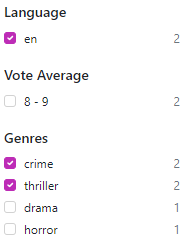About
This site aims to demonstrate the key features of the text-search-lite full text search engine developed by Center for Humanities Computing - Aarhus University. As text-search-lite can be configured in many different
ways to suite the needs of different kinds of projects this site only shows the main features which will often be a part the user interface of
a website with full text search capabilities, many different configurations will be possible as well.
A few components which in many cases could be relevant, but didn't fit the use case of the main site (movies), can be found under Components.
Query Language
A query language for making advanced text based queries is supported as default with the possibility of enabling/disabling each part of the language individually. The query language supports expressing:
- Required presence or absence of a term by prefixing the term with
+or-e.g.+peace not -war - Wildcard queries using
?and*e.g.comb?n*. - Fuzzy queries (edit distance) using
~e.g.mispeled~. - Targeting specific fields by prefixing the query part with one or more field names e.g.
title:description:(search only these fields).
The query language parser auto corrects any errors by converting them to normal text and the reports what the error was to provide feedback for the user. This makes the query language both safe and intuitive to use.

See the "help" section (click the menu item) for more examples of the query language and its features.
Facets

Facets, created from text-search-lite aggregations, gives an easy to understand overview of the search result (or the whole dataset) and
makes it possible to further filter the search result in an intuitive way.
When selecting a facet the search result is automatically updated as well as the document count for each facet. Only facets with a count > 0 will be shown.
Selected facets are included as part of the url so the applied facets can be shared when sharing a link to the search result.
Highlighting
Highlighting of the text matching the query makes it easy to see why the result was included and draws attention to the passages in the text which are relevant.
For fuzzy- and wildcard- queries highlighting especially shines as it shows which terms the query matches and why the result was included which often can be unclear and hard to deduct for queries which expands and transforms the initial input.
When using language analyzers for indexing, such as english, german or danish, terms will be stemmed to their root form to better handle matching on variants of the same term. The highlighter is aware of the stemming proces and makes sure the original variant of the term is highlighted in its entirety in the text.
